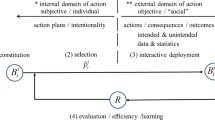Abstract
Value analysis establishes a way to practice functional analysis which enables to think all matter as sets of functions. The study of the correlations between the phases of activation of these functions leads to consider the aggregation of correlated activation functions as an attractor in a configuration space. This point of view allows figuring out general behaviors reducing the conceptual gap between microeconomics and macroeconomics. Then, based on a characterization of complex adaptive systems in terms of functional attractors, the theory links together value and physical magnitudes, like work or energy and action. The evolution of these systems is studied from the viewpoints of learning or of voluntary and involuntary interactions with others described in the ultimate way by the strategies, or operators, of which they make use. Three kinds of uncertainties are emphasized among which the uncertainty between the structure and the business outlook of a system is recreated through an analogy between physics and economics. The rationality of the complex functional systems economics is based on value and on market or environment awareness. Equilibria establish potential of agents or players whose profiles are built through the equivalence between a time-dependent payoff at equilibrium and the regular value of the corresponding attractor. The law of supply and demand is naturally founded on unbiased profiles of agents and can be a means of uncertainty reduction and of growth. Freedoms are opportunities to grow, when they result in confidence, and to bear risks in decision-making through an innovative process.







Similar content being viewed by others
References
AFNOR. (1996). Analyse fonctionnelle—Caractéristiques fondamentales. Norme Française NF X50-100. Paris: AFNOR.
Chauvet, E. (2006). The evolution of functional systems through the generalized uncertainty and Nash equilibria. American Institute of Physics Conference Proceedings AIP CP, 839, 579–590.
de la Bretesche, B. (2000). La Méthode APTE, Analyse de la Valeur, Analyse Fonctionnelle. Paris: Petrelle.
Nash, J. F. (1950). Non-cooperative games. In H. W. Kuhn & S. Nasar (Eds.), The essential John Nash (pp. 51–98). Princeton, NJ: Princeton University Press.
Nelson, R., & Winter, S. (1982). An evolutionary theory of economic change. Cambridge: Belknap Press of Harvard University Press.
Piriou, J. P. (2008). La comptabilité nationale. Paris: La Découverte.
Sen, A. (1999). Development as freedom. Oxford: Oxford University Press.
Stiglitz, J., & Walsh, C. (2004). Principes d’économie moderne. Paris: De Boeck Université.
Author information
Authors and Affiliations
Corresponding author
Rights and permissions
About this article
Cite this article
Chauvet, E. Value, a Way Out of Uncertainties: A Physical Model for Ethics and Freedoms. J Bus Ethics 113, 395–413 (2013). https://doi.org/10.1007/s10551-012-1311-9
Received:
Accepted:
Published:
Issue Date:
DOI: https://doi.org/10.1007/s10551-012-1311-9




